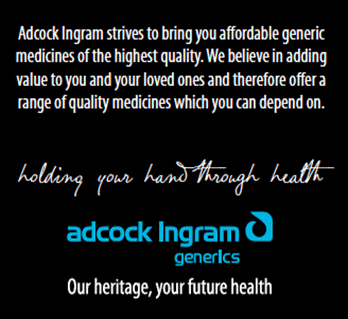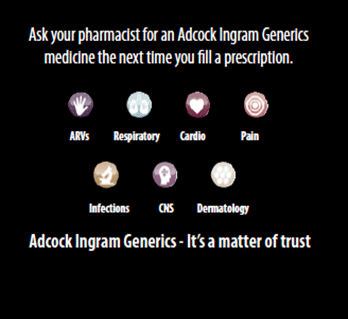- Prescription Hub
- Product Information
- Safety Notifications
- Allergies
- ARV's
- Baby Care
- Cardiovascular
- CBD
- CNS
- Colds & Flu
- Cough
- Dermatology
- Digestive Well-being
- Energy
- Feminine Hygiene
- Food & Nutrition Supplements
- Gastroenterology
- Generics
- Ophthalmology
- Pain
- Personal Care
- Respiratory
- Vitamins, Minerals Supplements
- Women’s Health
Generics
 Generic medicines are medicines that have the same active ingredients as the original brand medication but are usually more affordable.
Generic medicines are medicines that have the same active ingredients as the original brand medication but are usually more affordable.
Adcock Ingram manufactures generic medicines, which are registered for quality, safety and efficacy.1 Adcock Ingram is one of South Africa’s leading manufacturers of generic medicines and has been providing healthcare solutions for over a century.1
Our product list includes treatments for the most commonly occurring diseases and disorders and we have several generics that have become leaders in the generic category.1


What is a generic medicine?
A generic medicine is a medicine that is comparable to an originator branded medicine in dosage form, strength, quality and performance characteristics and intended use. An originator brand usually means the brand owned by the research company that did the research to develop the medicine in the first place.2In order to register a generic medicine, the manufacturer has to prove bioequivalence with the originator medicine. This means that the amount of drug found in the blood of the patient after taking the generic medicine should be at least the same as that found when taking the originator medicine.3 This indicates that the effectiveness of the two medicines - generic and originator - should be the same. It can then be said that the medicines are bioequivalent.4
When registering a generic medicine in South Africa, the same standards apply to the manufacturing and quality assurance of these medicines as apply to the originator medicines.
Generic medicines are usually sold at a more affordable price.5 In South Africa a pharmacist filling a prescription Is required to inform patients of the benefits of generic medicines, and then subtitute the originator medicine with a less expensive generic medicine.6
What is the benefit of generic medicines?
The increase in the cost of healthcare outstrips inflation throughout the world. Efforts are being made everywhere to reduce healthcare costs while continuing to maintain standards. One way to reduce these costs without compromising the quality of medical care is to substitute originator medicines with generic medicines.2It is now law for pharmacists and doctors to inform patients about generic medicines and then to substitute a less expensive generic medicine for an originator medicine on every prescription, unless the patient refuses the substitution.6 The intention is to make sure that effective medicines stay within the reach of the majority of people living in South Africa and to improve access to healthcare.
In order to comply with the law in substituting an originator medicine with a generic medicine:2
- The active ingredient of the generic must be exactly the same as the original molecule
- The generic must be administered in exactly the same way as the prescribed originator medicine e.g. oral or injection route of administration
- The dosage form must be the same e.g. tablet or capsule
How would I get a generic medicine?
When doctors and pharmacists dispense a prescription medicine, they are required by law to inform patients of the benefits of generic medicines and to substitute a less expensive generic medicine for the prescribed originator medicine, unless the patient refuses the substitution.6 As an individual you have the right to request a generic medicine. For example, if you are on chronic or long term medication for conditions such as hypertension or high cholesterol, the savings could be significant.2Can I refuse generic medicines?
It is important that a patient takes the advice of the doctor or pharmacist. In terms of the law a patient may refuse the substitution of a generic medicine.6References:
- IMS TPM MAT Data, March 2015.
- Generic Medicines. National Association of Pharmaceutical Manufacturers. [Online] 2014.[cited 2015 Apr 15]; Available from URL: http://napm.co.za/generic-medicines/
- Snyman JR. Bioequivalence: should we trust generic antibiotics? South Afr J Epidemiol Infect 2005;20(3):78-9.
- McLachlan AJ, Ramzan I, Milne RW. Frequently asked questions about generic medicines. Aust Prescr 2007;30:41–3.
- Facts about Generic Drugs. U.S. Food and Drug Administration. [Online] 2012 Sept 19.[cited 2015 Feb 27]; Available from URL: http://www.fda.gov./Drugs/ResourcesForYou/Consumers/BuyingUsingMedicineSafely/UnderstandingGenericDrugs/ucm167991.htm
- Medicines and Related Substances Act, 1965 (Act 101 of 1965).
Adcock Ingram Limited. Reg. No. 1949/034385/06. Private Bag X69, Bryanston, 2021, South Africa. Telephone + 27 11 635 0000





















